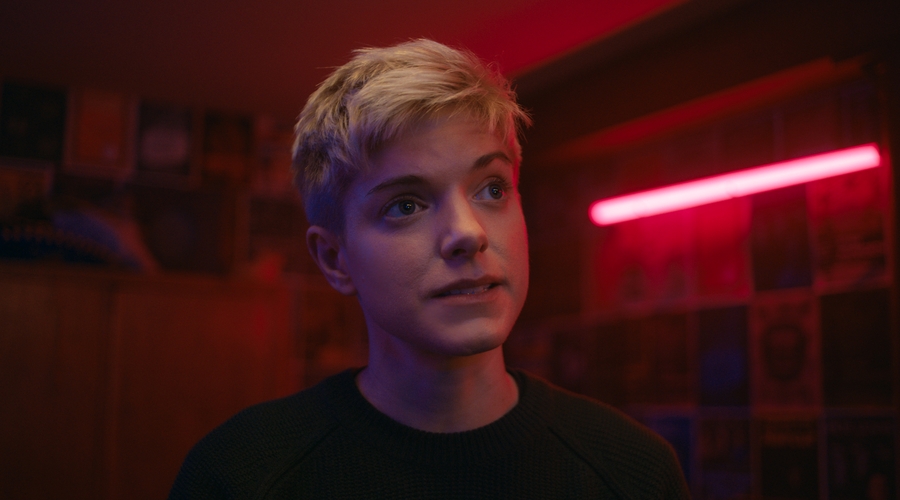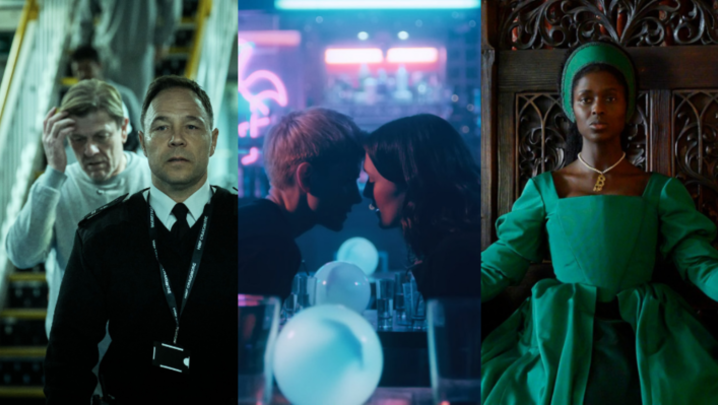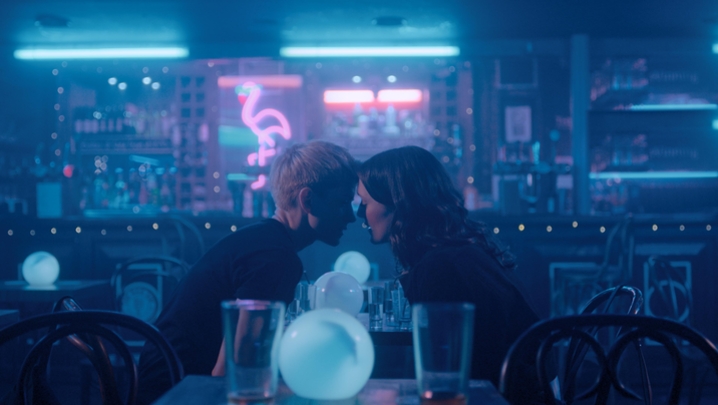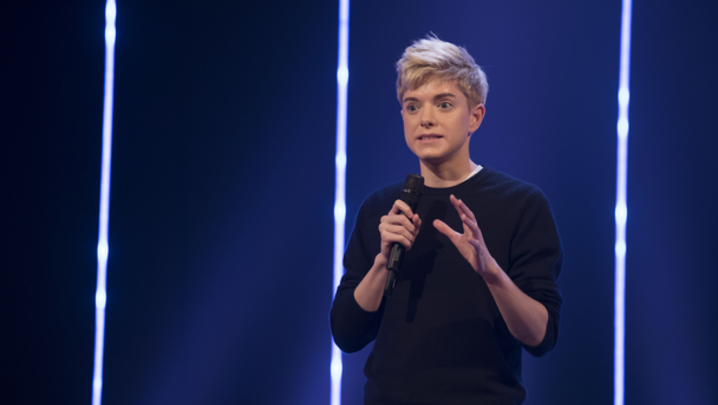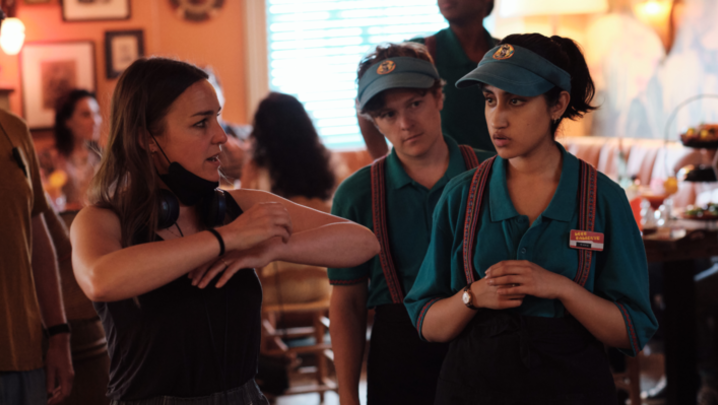In a year defined by high anxiety, TV fans looking for their next comfort watch may not have expected to find it in a series about a recovering addict, but then arrived Feel Good.
Created by Canadian comedian Mae Martin, the hilarious, warm and deeply personal comedy-drama sees Martin play a fictionalised version of themself: a bi-sexual stand-up navigating a new relationship with their straight girlfriend George, played by Charlotte Ritchie (Ghosts), while trying to keep their addictive impulses at bay.
Martin is no stranger to baring their soul for an audience. Having started stand-up at the tender age of thirteen, the comedian had the rare experience of going through puberty on stage. “It was probably not ideal in retrospect,” Martin admits. “It was a lot at that age, a lot of drugs around and roller-coaster adrenaline rushes from performances. Once you start performing, everything else pales in comparison.”
In adolescence, Martin developed a drug addiction and was kicked out of their house, before undergoing rehab. Despite the lows, the creative and open-minded comedy community exposed Martin to a space where they could really be themself. “In terms of my sexuality and identity, I was probably a lot more confident being who I was than I would have been if I was just in High School,” Martin explains. “I loved it. I still love it. I wouldn't change it."
Since then, the stand-up has built a remarkable career mining the most personal aspects of their life. Martin, who recently came out as non-binary via Instagram, explored gender, sexuality and the joys of fluidity in their acclaimed 2015 stand-up show ‘Us’. In 2017’s ‘Dope’, the comedian disclosed their vulnerabilities further with a frank and hilarious discussion of their continuing struggles with addiction.
With Feel Good, Martin took the anxieties explored on stage and ‘dialled them up to 11’ with the series’ co-writer Joe Hampson. “What we ended up with was a lot of emotional truth, but the actual events and people were largely embellished and exaggerated,” Martin explains. “I think season two is going to be even more exposing, which is kind of daunting.”
In the new series, a frantic, black-eye sporting Mae confronts their adolescent trauma in rehab before returning to win George back, all while teetering on the brink of self-destruction. Fear not, the series will still leave you clutching your sides as it breaks you in two.
“My least favourite thing is watching relationships on-screen where someone says something funny, and nobody laughs.”
Martin and Hampson’s fiercely truthful writing saw them take home the Comedy-Writer award at this year’s RTS Programme Awards, with Martin also winning the Breakthrough Award. The pair enjoy a lively writing partnership and despite spending ‘almost every day together for the past five years’, they have astonishingly never argued while writing.
“It’s kind of remarkable,” Martin laughs. “Joe’s got a nice objectivity on some of my neuroses.”
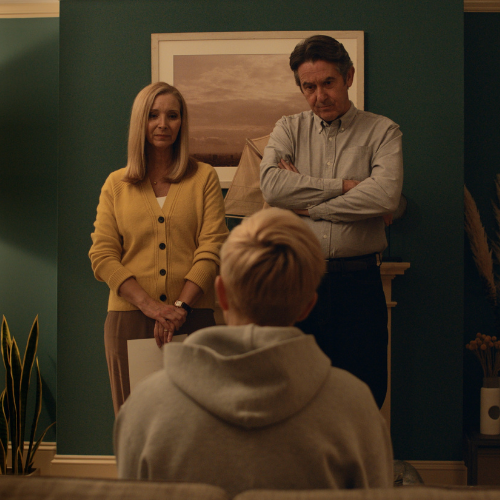
The duo loved creating a world where characters respond to Mae's often erroneous world view. Among the cast of eccentric characters, Lisa Kudrow puts in a scene-stealing performance as Mae’s wonderfully cold mum Linda; a woman so highly strung she goes on the Blackpool ghost train to find her zen. Martin jokes that their real parents were delighted that ‘someone of [Kudrow’s] calibre was coming anywhere near me’ but is quick to assert that the parents depicted on-screen are far from the real thing.
“Series one was drawing on decades old conflict and anxiety, and also that fear that everyone has about their parents not understanding or loving them,” Martin reveals. “It wasn’t a current or accurate depiction of where our relationship is at now, but for comedic effect, I dialled up some of their traits.”
The series garnered high praise for the way it tackles difficult subjects with a skilful lightness of touch, from strained family relationships and addiction to gender dysphoria and queer shame. For Martin, finding comedy in dark moments is an essential fact of life. “Even in the middle of breakups, or in the middle of a funeral, someone can make a joke, or you can suddenly be struck by the absurdity of existence,” the comedian explains.
Martin and Hampson are masters of wrong-footing the audience, delivering an emotional gut-punch or devastating one-liner when you least expect it: whether it’s George coming out to her friends while high on painkillers in hospital, or a scotch egg interrupting Mae’s 12-step programme apology.
“If the show can stop people keeping each other a secret, that's huge.”
At its heart, Feel Good is a love story about two people who may not be right for each other, but you can’t help but root for them nonetheless.
The key ingredient to Martin and Charlotte Ritchie’s captivating on-screen chemistry is their shared sense of humour. “We really find each other funny,” Martin says. “My least favourite thing is watching relationships on-screen where someone says something funny, and nobody laughs.”
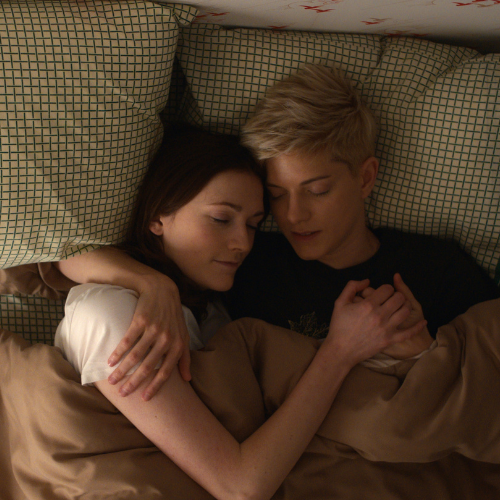
Martin and Ritchie were on the opposite end of the spectrum: they found each other too funny. Initially, the pair could not make it through a scene without bursting into fits of laughter. “It was a real problem. In the first audition it was like, ‘oh this will never work because we can’t make eye contact with each other,'” Martin laughs. “So [Ritchie] had to audition another time and we were like, ok, we need to get serious. I'm glad that we did because she's ended up being such an inextricable part of the show and there’s so much of her in that character.”
With Feel Good, Martin has found that the more specific they made the story, the more universal the response. The comedian recalls being stopped by a girl who revealed her life effectively mirrored George’s story, and Feel Good motivated her to come out to her friends and introduce her girlfriend to them. “That meant a lot,” reflects Martin. “If the show can stop people [from] keeping each other a secret, that's huge.”
Feel Good’s place within the queer TV canon is one of extreme pride for Martin, but it is a daunting mantle to take on. “I think representation is so important, and I hope by telling my specific experience that people do feel represented,” they explain. “But, because there still isn't much queer TV, sometimes there's a sense that it has to reflect everybody's experience in the queer community, and it has to be held to that.”
The responsibility of representation can become a trap, Martin continues: “[Mae and George] are flawed characters, and sometimes there's some pressure to be like, ‘Oh, we see so few queer couples, why does this have to be a toxic fucked up relationship’ … but I’m just telling [people] my personal story.”
Martin confirms the upcoming series will be the show’s last. With American rapper Eve, Jordan Stephens (Catastrophe) and Anthony Head (Ted Lasso) joining the already stellar cast, Feel Good is set to bow out at the peak of its powers after just two series, much like Fleabag and Fawlty Towers. “We wouldn't have done a second series if we didn't think we could top the previous one,” Martin says. “And I think we have.”
The upcoming series will explore whether the couple can transform their relatively toxic relationship into a healthy one. “We're big fans of ambiguity,” Martin says. “My character is reckoning with her past and George is blossoming in various ways. It's about whether they can grow together or apart, but it's funny and sad…you know, the usual.”
Feel Good’s second series lands on Netflix on 4 June.

